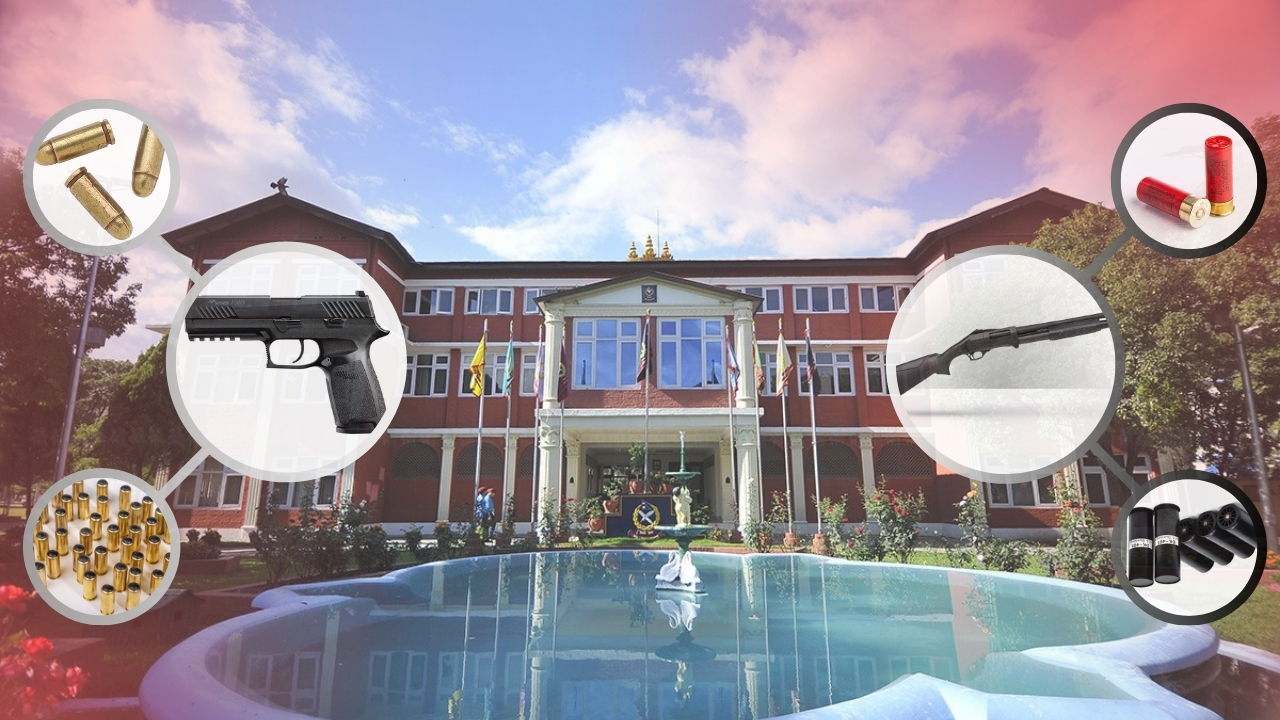Nepal Police is preparing to procure weapons after nearly 10 years.
For a long time, the police have been complaining about the lack of necessary weapons. With the government allocating budget for purchasing weapons this time through the budget for the fiscal year 2025-26, they are set to purchase weapons again.
The police are particularly focusing on acquiring weapons needed for crowd control.
Police officials have often pointed out the shortage of basic crowd-control weapons, especially during protests and movements in Kathmandu and other areas. As a result, weapons needed in one district were borrowed from another, creating logistical challenges.
According to Deputy Inspector Genral Binod Ghimire, central spokesperson for Nepal Police, preparations are underway to initiate a new process for weapon procurement.
“A new process will begin for purchasing weapons. Tenders have not yet been called. Weapons will be purchased in a lawful and systematic manner,” he said, adding, “The budget has also been allocated.”
He said that the police currently need pistols and other crowd control weapons.
"What we need the most are pistols. Police officers deployed in the field are facing a shortage of pistols," he said. "When there are some programs or events, we are forced to borrow pistols from other districts."
He added that gas guns for firing tear gas, body protectors, and other equipment needed for crowd control will also be procured.
Police officials say some of the existing weapons are no longer functional, creating additional challenges.
There have also been occasional criticisms regarding the use of expired tear gas shells. The Rastriya Prajatantra Party had accused the police of using expired tear gas shells during a protest held in Tinkune of Kathmandu on March 28.
According to a high-ranking police source, the police plan to procure pistols, shotguns, bullets, gas gun shells, cartridges, body protectors, and shield helmets. The estimated budget for the procurement is Rs 890 million.
The source revealed that the police are set to purchase 900 9-mm pistols along with 11,000 rounds of ammunition. Additionally, they plan to acquire 1,100 12-gauge folding shotguns, 20,000 rounds of rubber bullets, 22,000 gas gun shells, and 20,000 shotgun cartridges.
Limited firms have started registering to participate in the procurement process.
“Preparations are being made to issue tenders. A notice will be published. There are limited firms in Nepal, but firms from abroad or within Nepal can participate in the tender,” the source said.
The last time Nepal Police procured weapons was nearly a decade ago in 2015. “Three years ago, preparations were made to purchase weapons, but it didn’t materialize. Before that, the police procured weapons in 2015,” DIG Ghimire said.
The police had planned to procure weapons in 2022 as well. The Police Headquarters initiated a procurement process at the time, citing a severe shortage of weapons that affected election duties.
The Cabinet approved the purchase of weapons on April 6, 2022.
During the local elections held in May 2022, the police borrowed 999 pistols from the Nepal Army citing a shortage of weapons. At that time, police had requested Rs 940 million, but only Rs 840 million was allocated.
However, the procurement process was met with protests over allegations of collusion with middlemen.
After the issue was raised in Parliament as well, Nepal Police Headquarters issued a statement clarifying the shortage of weapons, but the procurement process was not completed.
Recent reports suggested that Nepal Police was reviving the old process to procure weapons. On July 18, members of the National Assembly’s Federalism Enablement and National Concerns Committee questioned Home Minister Ramesh Lekhak, Nepal Police IGP Deepak Thapa, and Armed Police Force IGP Raju Aryal about the revival of old tenders for procuring weapons.
All three clarified that the weapons would be procured as per need through a new process.
IGP Thapa said that no instructions were received from the home minister or home secretary regarding the procurement.
“Neither the Home Ministry’s secretary nor the minister has given any directives,” Thapa said. “Procurement is not something done by directives. It is carried out systematically, following laws and regulations passed by the legislature.”
He noted that the weapon procurement was included in the budget’s “red book.”
"It has been prioritized in the budget," Thapa said. "Our priority is non-lethal weapons, such as tear gas shells and rubber bullets. Additionally, barricading vehicles and troop carriers fall within our organizational priorities, for which the Nepal government has allocated a budget. We will carry this out in a transparent, accountable, and responsible manner."
Home Minister Ramesh Lekhak clarified that old tenders would not be revived for procuring weapons.
“There is no question of reviving or proceeding with tenders for weapons from the past,” Lekhak said. “Tenders opened two, three, or four years ago will not be continued or used for weapon procurement now.”

